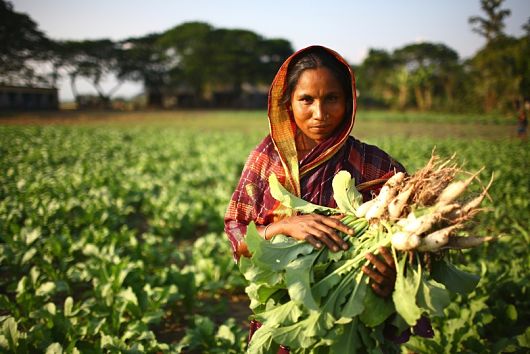Hari Sreenviasan: If there's one thing most Americans know about Iowa, it's that it's farm country. Less well known is that roughly half of Iowa farmland is owned or co-owned by women. Special Correspondent Mark Bittman sat down with farm-owner and educator Jean Eells to learn more about the growing role women are playing in Iowa's agriculture now – and in its future. This report is part of our "Future of Food" series, supported by the Pulitzer Center.
Mark Bittman: Jean Eells is an Iowa landowner and educator.
Jean Eells: So I grew up on a small farm in Iowa. I ended up being appointed to the state Soil Conservation Committee and heard a presentation that really blew me away. I learned that women own or co-own half the land in Iowa. And yet I didn't see them active as conservationists, and that–I was curious about that. How could that be?
Mark Bittman: Eells learned that many women farm-owners have no experience farming themselves. They hire tenants to do it – most of them men.
So 1998 Eells co-founded an organization called The Women, Food and Agriculture Network. She holds meetings with other women landowners in Iowa and across the country, teaching them about land conservation and the role the women could potentially play in making sure their farmer-tenants are implementing sustainable practices. She's held more than 250 meetings since 2009 – educating more than 3800 female landowners.
Jean Eells: One of the things that we find is that they have a real deep seated concern for the community, for their farmers, for their family. And they really want to keep the land. And yet they don't necessarily get to express that caring and concern because you just don't talk about those things.
Mark Bittman: She says that's mostly because of decades old tradition: Men farm. Men make decisions about the land. And women are not involved, even when it's their land. They can have tremendous influence because they actually own this land.
Jean Eells: When I talk to men about this they're like it's your land. What's the big deal? it's your land. And there's a lot heavier lift for women in that particular setting. So if you think about women my age in particular. We weren't encouraged necessarily to go into science. The men make the farming decisions you know about what you're going to plant in the seed and all that kind of stuff. We talked to women all the time that feel like they don't have a right to do those things.

Mark Bittman: It's really a conversation about how do you, how are you changing gender roles or how are you getting men who have spent their entire lives acting and–for want of a better term — a sexist manner to like be more respectful of the women they are dealing with?
Jean Eells: Yeah. I'm holding out hope that if we change the conversation, and give women a place at the table something's going to change, it's just going to it's gonna have to.
Mark Bittman: In all-female meetings, Eels teaches conservation practices. They include: Planting a buffer along the edge of a creek, to protect waterways from harmful chemical fertilizers … and planting what are known as "prairie strips" which keep roots in the ground year round and brings plant diversity and wildlife to the land
Jean Eells: We know that 50 to 70 percent of the women who come to a one day meeting will take an action to improve conservation on their land.
Mark Bittman: That's kind of great.
Jean Eells: It's huge. To have them make a big change and have it be transformative is just. I mean that's sheer joy as an educator. We always just talk about farmers. They're not the only decision makers out there that can make that difference. We've got to change how we talk about the landscape.













